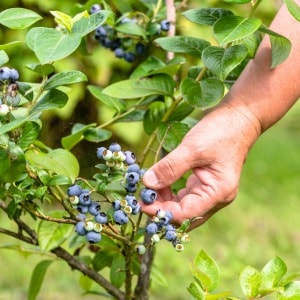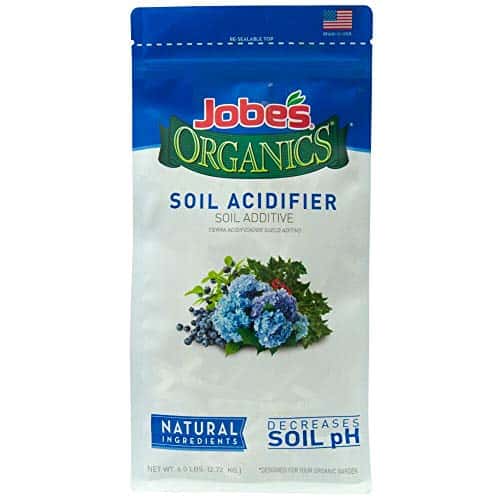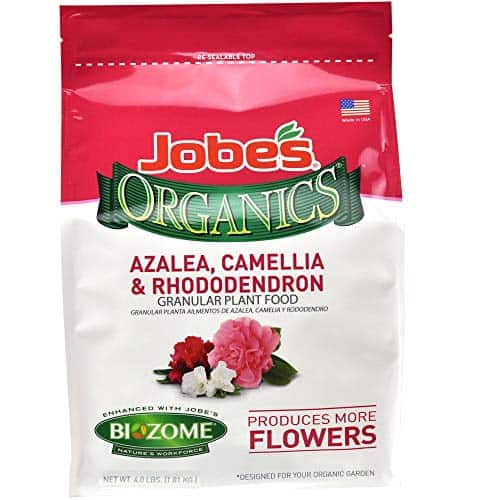How to Fertilize Blueberries
This post may contain affiliate links.
If you are growing blueberry bushes and are fairly new to gardening, you are probably wondering how to fertilize blueberry bushes. Blueberries require high acid soil, which often requires amending your garden soil.
Most beginning gardeners plant blueberries not knowing the pH level of their garden soil (myself included). When planting blueberries, it is very important to test your soil with a soil testing kit like this one to find out the acidity level of your soil.
After you have tested the pH level of your soil, you will know what your blueberry plants need to thrive and produce well year after year.
The pH level of your soil should be between 4.5 and 5.5 for growing blueberries. If the pH level of your soil is lower than this, you will need to amend your soil for your blueberry plants to increase the acidity level of your soil.
If you need to adjust the pH level of your soil, you will want to amend the soil with a soil amendment like this one. Check your pH level weekly after you have amended the soil until the pH level is within the correct range.
Jobe’s Organics 9364 Fertilizer, 6 lb Jobe’s Organics 9826 Fertilizer, 4 lb
Jobe’s Organics 9826 Fertilizer, 4 lb
What is the Best Time to Fertilize Blueberries
Check the pH level of your soil around your blueberry plants yearly to see if the soil needs amending.
If you have just planted your blueberry bushes, you can wait about a month until you fertilize them for the first time.
Related Article: Optimizing Soil pH for Blueberries: A Guide for Successful Growth
The best time for fertilizing blueberries is in the early spring when the plants start sprouting leaves. You can then fertilize every 2 months until you have harvested the blueberries and they are finished fruiting for the year.
As far as choosing a fertilizer, fertilizers that provide a slow release of nitrogen work well for blueberries. Fertilizers used for rhododendrons and azaleas like this fertilizer work well for blueberries, since those plants like the same high acid soils that blueberries do.
Are Coffee Grounds Good for Blueberry Bushes?
A natural way to amend low acid soil is to add coffee grounds to the soil. Add several cups of dried coffee grounds to the soil around each blueberry plant. Work the coffee grounds into the top layer of the soil.
Coffee grounds can be added to the soil monthly to add to the acidity of the soil. Continue to test the pH level of your soil to make sure you don’t alter the pH level too much by adding the coffee grounds.
Related Article: Blueberry Leaves Turning Red: Causes and Solutions
How to Fertilize Blueberries with Vinegar
Some people wonder if you can acidify water for blueberries. As a matter of fact, white or apple cider vinegar that you use for cooking, when mixed with water, can be used to increase the acid level of your soil.
Add 1 tablespoon vinegar to 1 gallon of water and water your blueberry plants with the vinegar mixture twice per week during growing season.
Related Article: How to Bring Back a Dead Blueberry Plant: Tips and Tricks
Continue to test the pH level of your soil weekly to make sure you have not added too much acid. If your pH level is within 4.5 to 5.5 there is no need to continue adding the vinegar.

Related Articles
- Homemade African Violet Fertilizer
- Best Fertilizer for Peppers
- How to Fertilize Hostas
- Using Epsom Salt to Fertilize Houseplants
- Best Natural Fertilizer for Tomatoes
- 6 Natural Fertilizers for Indoor Plants
- How to Use Banana Peels to Fertilize Houseplants
- How to Make Homemade Plant Food
- Using Epsom Salt as a Natural Fertilizer in the Garden
- How to Fertilize Hanging Flower Baskets
- What is Lawn Aeration and What Does it Do?
Follow my gardening for beginners board on Pinterest.








Aluminum sulfate or 32% is the fastest way to drop ur ph of soil and if it gets to low add crushed lime to raise it back up
Loved your blueberry article I bought some last year and they are slowly growing. I was wondering if you had any advice on an heirloom lilac bush?
I have one that’s over a hundred years old and looking pretty scruffy. How can I improve this poor thing?
This is so interesting! I never would have thought to use vinegar, I usually just use an Espoma soil acidifier! I’m going to try this, this year! Great info!